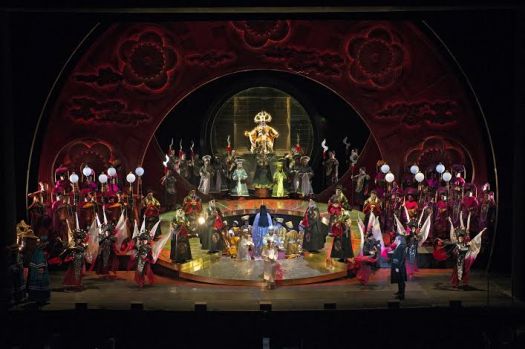
Cincinnati Opera's "Turandot" Great Spectacle
"Il suo nome è Amor." “His name is love.”

Thus ends Giacomo Puccini’s “Turandot.” Set in China in legendary times, Puccini’s final work was given a brilliant performance by Cincinnati Opera before a near sellout crowd Saturday night at Music Hall.
It is dawn and if Princess Turandot can discover the name of the Unknown Prince who has won her hand by answering three riddles, she can have him killed rather than submit to his love. Love, however, wins out in this retelling of the fairy tale play by Carlo Gozzi. The formerly cold-hearted Turandot, who names the Prince “Love,” melts in his arms.
A co-production of Cincinnati Opera and the opera companies of Minnesota, Pittsburgh, Utah and Seattle, “Turandot” closed Cincinnati Opera’s 95th season with power and artistic elegance. Directed by Renaud Doucet, with scenic and costume design by André Barbe, it filled the eyes and ears from start to finish.The curtain went up on a blood red stage, with a huge gong hanging at the left. Gruesome masks of severed heads hung above, representing Turandot’s previous, hapless suitors. Roles were sung by a fine ensemble of singer/actors, most of them in their Cincinnati Opera debuts, including sopranos Marcy Stonikas as Turandot and Norah Amsellem as the servant girl Liù.
Filling in for tenor Stuart Neill, who cancelled because of illness, was tenor Frank Porretta as Calàf, the Unknown Prince. (Porretta last sang with Cincinnati Opera as Canio in “Pagliacci” in 2012.)
Ramón Tebar conducted the Cincinnati Symphony Orchestra.
Highlights were numerous, none more so than when Porretta as Calàf struck the gong at the end of act I, thereby accepting Turandot’s challenge to answer three riddles or forfeit his life.
The court officials Ping, Pang and Pong, sung by baritone Jonathan Beyer, tenor Julius Ahn and tenor Joseph Hu owned one of the most delightful scenes in the opera, i.e. at the beginning of act II where they stripped to their underwear and sang about their previous, happy lives in the country (where they did more than go over sacred books and arrange funerals for Turandot’s victims). Longingly, they sang of the hoped-for arrival of peace and love in the kingdom.
The scene at court where Stonikas as Turandot (fittingly garbed in white) faces the Unknown Prince was gripping: “No man shall ever possess me,” she sang imperiously, as the Emperor (who because of a vow has no choice but to go along with Turandot) watches from his throne high at the rear of the stage. Her three riddles were delivered in a chilling voice, to be answered one by one by Calàf.
Porretta’s “Nessun dorma” – one of the most familiar arias in the literature – was thrilling, girding up one’s expectations for the final encounter. Amsellem as the heroine Liù – who refuses to reveal Calàf’s name under torture -- made a fine impression as the one who teaches Turandot what love is. Stonikas as Turandot cried audibly.
Tebar led the CSO with insight and precision in the pit.
In short, this is a must-see for Cincinnati Opera’s 2015 season. Repeats are Wednesday and Friday at 7:30 p.m. at Music Hall. Tickets while they last, begin at $35 at (513) 241-2742, or visit www.cincinnatiopera.org
Announced at Saturday’s performance was the lineup for Cincinnati Opera’s 2016 summer festival, to include: “Fidelio” by Beethoven, “Die Fledermaus” by Johann Strauss Jr., “Fellow Travelers” by Gregory Spears and Greg Pierce (a world premiere) and Puccini’s “Tosca.”
Also announced was the creation of a new fund-raising campaign for Cincinnati Opera, the New Century Campaign, to be completed in 2020 (the Opera’s 100th anniversary). With a goal of $15 million, $8 million has been raised so far.